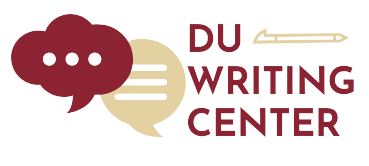By Stephanie Yamoah
This Fall we will be publishing a series of spotlight articles about multilingual students and faculty at DU. These articles are based on interviews that Dr. Kamila Kinyon and a group of multilingual students conducted about interviewees’ lived experiences, including continuing connection to heritage languages, role as writers and teachers at DU, and thoughts about multilingual and multicultural identity. This project is funded by a Faculty Research Fund Grant awarded to Dr. Kinyon for 2023-25. We welcome this opportunity to celebrate DU’s multilingual community.
Dr. Alfred Owusu-Ansah’s multilingual journey is a richly woven narrative that draws from his cultural background, immersive experiences, and profound connection to his native language, Fanti. Born in Cape Coast, Ghana, Dr. Owusu-Ansah grew up in a Fanti-speaking household despite both his parents being English teachers. “We did not speak English at home,” he recalls, emphasizing the importance of Fanti in his upbringing. His early childhood in Scotland further exposed him to English, creating a bilingual environment that shaped his linguistic abilities from a young age. “We lived in Scotland for about four years, and we still spoke Fanti at home, but then everyone around us obviously spoke English.”
Dr. Owusu-Ansah’s sense of ethnic identity is deeply intertwined with his native language. A poignant memory from his childhood highlights this connection: “I was in Class 3 when I had to write an essay about myself. I was confused about my ethnic identity and asked my mother if I was Fanti or Agona. She explained that we were Agona-Fanti, connecting me to my heritage.” This dual identity persisted, influencing his linguistic journey as he navigated different dialects of Fanti and the dominant English language used in education and religious settings.
The hybrid use of language is a notable aspect of Dr. Owusu-Ansah’s experience. He shares a common Fanti habit of mixing languages, a practice he learned to navigate with the help of a dedicated tutor upon returning to Ghana from Scotland. “For a long time, Fantis were accused of not speaking pure Fanti or speaking Fanglish, a mixture of Fanti and English. My tutor once told me to write the English word in quotation marks if I couldn’t recall the Fanti equivalent, which helped me think in Fanti.”
Dr. Owusu-Ansah’s fluency spans several languages, with Fanti and English being dominant. He humorously recounts how he challenged perceptions of his language proficiency: “I always contest when people say that I’m a second language user of English. I cannot differentiate between my acquisition of Fanti and English.” His linguistic repertoire also includes Twi, acquired in secondary school, and rudimentary French, learned from a Togolese tutor.
His multilingual experiences are also marked by cultural crossings. Moving back to Ghana from Scotland and later relocating to the United States for his PhD in a language-focused program presented unique challenges. He recalls the difficulty in transitioning from British to American spelling and the differing rhetorical styles in academic writing. “My professor indicated that I spent too long getting to the point. I realized I was building the logic in a Fanti way, where storytelling precedes the main point, unlike the American preference for early thesis presentation.”
Dr. Owusu-Ansah’s educational journey further enriched his multilingual experience. His elementary and secondary school years in Ghana were marked by the introduction of French and the social dynamics of boarding school, where “Twi became a lingua franca.” His university experiences, including teaching at KNUST in Ghana and pursuing advanced studies in the U.S., broadened his linguistic and cultural horizons.
In essence, Dr. Alfred Owusu-Ansah’s multilingual story is proof of the complex interplay between language, culture, and identity. His journey reflects a deep connection to his roots, a keen adaptability to new linguistic environments, and an enduring passion for preserving and navigating his multilingual heritage. In his concluding remarks, Dr. Owusu-Ansah emphasizes the intrinsic value of language to personal identity and culture. He states, “I mean to everyone, whether you’re so-called monolingual or multilingual, translingual, polylingual, your language matters and it’s a part of who you are. Your identity, your culture and even those who speak just English, you might not realize it, but you speak more than one variety of English at any given moment. And so, it matters that you have those experiences. I appreciate that DU is a space that allows students, faculty, staff, and the community to be themselves in the different languages that they use to express their realities. I think it’s a great thing. So be you and enjoy being you.”

